It’s no secret that retail has been profoundly changed by the rise of B2C ecommerce platforms. These platforms not only simplify the buying and selling process but also broaden the reach of businesses to global audiences. As consumers increasingly favor online shopping for its convenience and variety, selecting the right internet commerce platform becomes crucial for businesses aiming to thrive.
In this article, we take a look at the top B2C ecommerce platforms of today, each distinguished by unique features and capabilities that cater to different business needs and scales. From robust enterprise solutions to user-friendly options for small businesses, understanding these digital commerce platforms can help you choose the best fit for launching or expanding your online presence!
What is B2C ecommerce?
Business-to-consumer (B2C) ecommerce refers to the online selling model where businesses sell products and services directly to consumers, bypassing traditional intermediaries such as physical stores. This model is most commonly seen in online retailing where customers can browse and purchase products through websites or mobile apps.
What is the difference between B2C and B2B ecommerce?
B2C and B2B (or business-to-business) ecommerce differ primarily in their customer base and transaction dynamics.
B2C ecommerce focuses on the sale of products or services directly to individual consumers, emphasizing convenience, quick purchasing processes, and customer experience. It caters to the emotional and immediate needs of individual buyers, often featuring streamlined checkout processes and extensive customer support.
In contrast, B2B ecommerce involves transactions between businesses, such as a manufacturer selling to a retailer or wholesaler. These transactions are typically larger in volume, more complex, and involve longer sales cycles. B2B ecommerce often requires more detailed product specifications, bulk pricing options, and the ability to handle extended payment terms and purchase orders, reflecting the logistical and strategic needs of business customers.
What is a B2C ecommerce platform?
B2C ecommerce platforms streamline the shopping process by offering detailed product information, customer reviews, and comparison tools, enhancing convenience and decision-making for shoppers. They also allow businesses to reach a broader audience of potential customers at lower costs compared to physical stores.
In B2C digital commerce, single-vendor platforms and multi-seller marketplaces serve different business models.
A single-vendor platform is operated by one business selling directly to consumers through its own branded website—like Nike.com. This model offers full control over branding, customer experience, pricing, and inventory. Pros include stronger brand loyalty and personalized marketing. However, it requires more effort in logistics, marketing, and customer acquisition.
A multi-seller marketplace, like Amazon or eBay, allows multiple independent sellers to offer products to consumers on a shared platform. The marketplace handles infrastructure, traffic, and often fulfillment. This model provides e-tailers with broad reach and low setup costs. On the downside, there's fierce competition, less control over branding, and fees for listings or transactions.
In summary, single-vendor platforms suit brands wanting control and a direct relationship with customers, while multi-seller marketplaces are ideal for reaching a wider audience with fewer operational hurdles. The choice depends on business goals and resources.
The growth of B2C ecommerce has transformed the retail landscape, emphasizing speed, efficiency, and personalization in consumer transactions.
Important features to look for in a B2C ecommerce platform
Selecting the right B2C platform for internet commerce is crucial to delivering a smooth shopping experience for your customers and ensuring that your business runs efficiently. Whether you’re selling products in a niche market or building a large online store, the platform you choose should offer a complete solution that meets your business needs and allows for enjoyable sales experiences.
From strong technical support to features that help manage everything—whether your product catalog consists of cat toys or luxury goods—here are some of the most important things to look for as you search for the ideal online commerce platform for your B2C business.
Basic features
- User-friendly interface
No matter if you’re a newbie or an expert when it comes to selling online, you will want to be sure to select digital commerce software that’s easy to use. A platform that features easy navigation, intuitive design, and mobile responsiveness can help make life the experience of selling online easier and more enjoyable.
- Secure payment gateway integration
Secure payment gateway integration is crucial for bolstering customer confidence as well as protecting your business. It’s also advantageous to give customers a variety of options for buying from your website by ensuring that your chosen platform supports multiple payment methods (credit/debit cards, PayPal, digital wallets, etc.).
- Product management
Even if your product catalog doesn’t include hundreds of items, it’s important to be able to easily manage the products you have for sale. Verify that your web commerce platform allows for the easy addition, categorization, and management of products with images, descriptions, and pricing.
- Shopping cart and checkout
Keeping your online store’s buying experience as easy as possible for visitors is essential to convincing them to convert into customers. An internet commerce solution that supplies a streamlined checkout process and makes it possible for visitors to easily add, view, modify, and remove products from the cart will better support conversions and enhance the overall customer experience.
- Order management
Software that allows for order, shipping status, return, and customer notification tracking ensures the efficient processing and fulfillment of orders. With a good order management system in place, you can boost customer service and the buying experience by delivering orders in a timely fashion and allowing your business’s customers to keep an eye on the status of their purchases.
- Customer support and contact options
While being mysterious can sometimes be a good thing in online sales, such as when teasing a new product for instance, it’s best to be clear and up front when it comes to customer service. Your chosen web commerce platform should make it easy for people to get in touch with you via live chat, email support, or contact forms for customer queries.
Advanced features
- AI-powered personalization
AI-powered personalization in ecommerce involves analyzing user behavior, preferences, and past purchases to deliver tailored product recommendations, dynamic pricing, and personalized shopping experiences based on customer data. This makes it possible to differentiate your business, drive sales, and build stronger relationships with your customers.
- SEO and marketing tools
It’s not enough to simply create a stunning online store offering amazing products—you need to let people know that your web commerce site exists too! Basic SEO settings (meta tags, URLs), email marketing, and discount/coupon management can bolster your marketing efforts and aid in attracting organic traffic, increasing visibility, and growing sales.
- Advanced analytics and reporting
With advanced analytics and reporting tools available via digital commerce platforms, you can obtain valuable insights on customer behavior, sales trends, abandoned shopping carts, and marketing performance. This data will help you to optimize product pricing, inventory, and marketing strategies, improving decision-making and profitability.
- Subscription and loyalty programs
According to Forbes data, attracting new customers can be five to seven times more expensive than retaining old customers. It will therefore be worth taking the time to see what you can do to keep your current customers coming back for more. Offering memberships, repeat orders, and customer reward programs are great ways to further support the customer experience and boost retention.
- AI chatbots and virtual assistants
AI chatbots and virtual assistants can improve customer service and online shopping experiences by providing instant support, answering queries, and guiding users through the buying process 24/7. These tools reduce the time it takes for your business to respond to customer queries, improve user experience, and increase sales by offering personalized recommendations.
- High-level security and compliance
Platform features like advanced fraud detection, encryption, and multi-factor authentication safeguard transactions. Adhering to regulations (e.g., GDPR) ensures legal compliance, reduces risks, and enhances the credibility of your business, ultimately increasing customer confidence and retention.
Best B2C ecommerce platforms: A list of the top 11 solutions to create websites
Although any B2C ecommerce platform will make it possible for e-merchants to create an ecommerce website, the various solutions on the market all have benefits and drawbacks, with each offering a different set of features to help users achieve their business goals and avail of the many functions of electronic commerce.
To help you decide which software is right for your entrepreneurial needs, here’s our list of the best B2C ecommerce platforms available today.
1. WiziShop
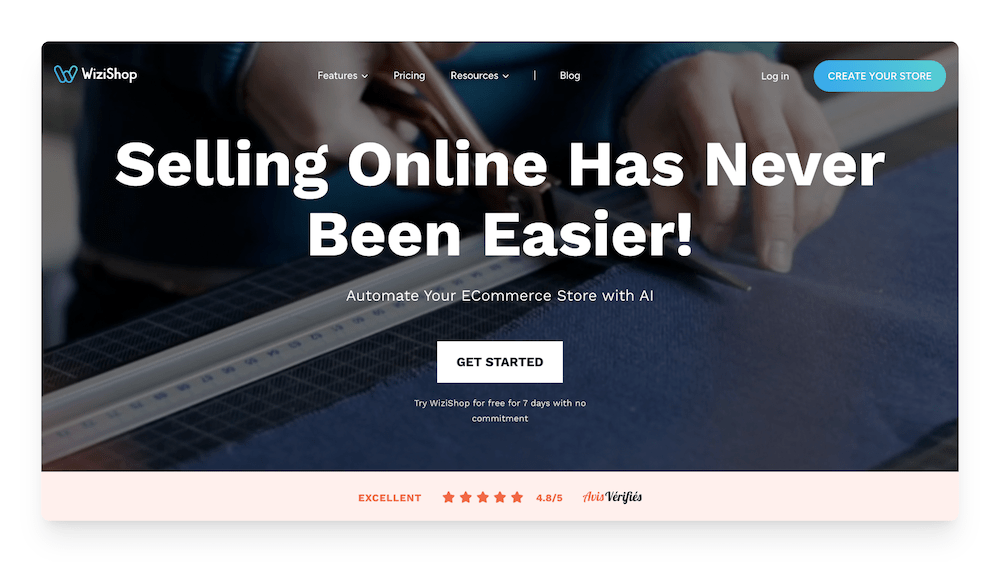
The WiziShop all-in-one ecommerce platform makes it easier than ever before for aspiring e-merchants to launch and run a business on the internet. Proving its worth as an online store builder since 2008, the cloud-based solution is dedicated to helping users succeed in selling online. Whether you’re completely new to internet commerce or want to migrate your existing business, WiziShop has got you covered!
With the WiziShop platform, there’s no need to invest in additional apps or plugins for your store—everything is included in your subscription: a plethora of design templates to easily create a website that matches your brand, over 400 pre-integrated ecommerce features to boost your marketing, improve cart performance, and drive sales; more than 50 SEO optimizations to take your website to the top of Google’s rankings; personalized support from our knowledgeable team of Business Coaches to aid you in achieving your goals; access to our helpful AI chatbot Maia to answer your queries at any time of day; free training included with all subscriptions to expand your knowledge of internet commerce and help you create engaging, seamless experiences for your customers; and more.
WiziShop also offers a wide range of AI tools developed to boost your productivity and efficiency when it comes to running your online store. Avail of our AI ecommerce innovation for generating text content to create SEO-friendly product descriptions, write articles for your blog, translate texts, produce compelling ad copy, and craft engaging hooks that can help increase consumer interest in your product catalog—all in a matter of seconds!
Price: WiziShop subscriptions start at $24.90 per month with transaction fees beginning at 2% per sale.
Free trial: 7 days
Key features:
- 🤖 AI integration: Tools like AI-generated content creation and smart segmentation to streamline store management
- 🎨 Customizable design templates: A variety of free, responsive design templates that can be tailored to reflect your brand identity, providing a unique and professional look to your store with no coding knowledge required
- 🔍 Advanced SEO tools: 50+ built-in SEO optimizations to help your store rank well on search engines, driving organic traffic and increasing visibility
- 📣 Marketing and sales optimization: Integrated features like upselling, cross-selling, abandoned cart recovery, and promotional tools to boost your conversion rate and average order value
- 👥 Personalized support: Access to responsive Business Coaches and an in-dashboard chatbot for assistance
Try WiziShop free for 7 days
THE EASIEST NO-CODE ECOMMERCE SOLUTION✅ No credit card required
✅ Access to all features
✅ No commitment
2. Amazon
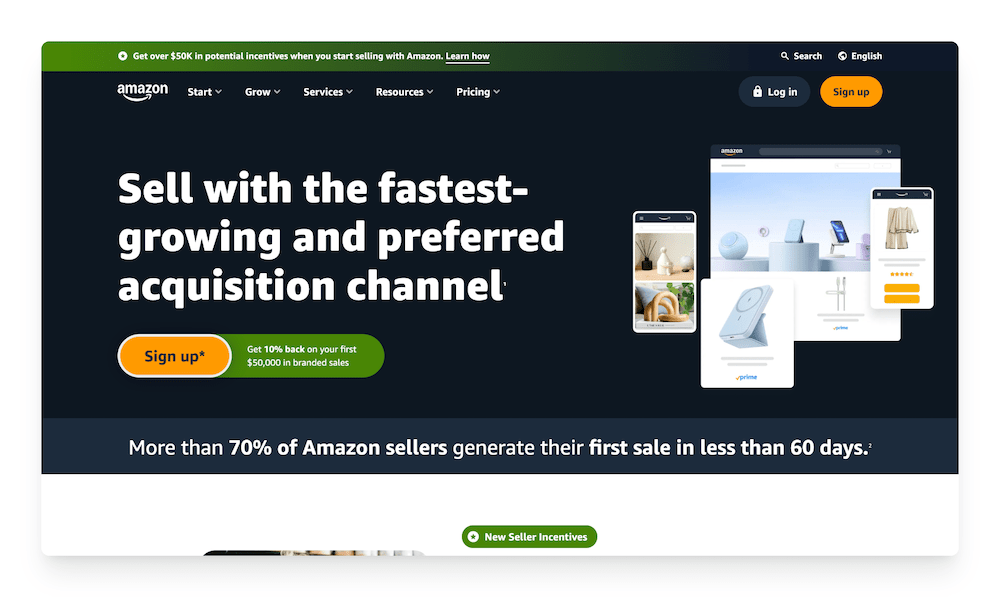
Serving as both a B2C and a B2B ecommerce platform, Amazon’s global popularity has made it one of the top marketplace options for selling products online. The company was launched by Jeff Bezos in 1994 and started as an online bookstore, swiftly expanding into a diverse B2C internet commerce giant. It revolutionized how consumers shop by offering an extensive range of products at competitive prices, a seamless cart and checkout process, and reliable delivery experiences that set a new standard in online retail.
For businesses, selling on Amazon provides vast exposure to millions of customers, a trusted platform for transactions, and fulfillment services through Amazon’s FBA (Fulfillment by Amazon). According to the company, over 60% of the sales on Amazon are generated by independent sellers, the majority of whom are small and medium-sized businesses.
However, there are disadvantages. High competition can drive down prices and margins. Amazon also charges significant fees, which can erode profits. The web marketplace controls customer data and interactions, limiting merchants’ ability to build direct relationships with their customers. Furthermore, Amazon’s own products often compete directly with third-party sellers, potentially prioritizing its products over others.
Price: Merchants can opt for the Individual plan, paying $0.99 for every item sold, or the Professional plan for access to all the platform’s features, paying $39.99 per month. In addition, Amazon charges a selling fee for every item sold, which varies depending on the product category and ranges from 3% to 45%.
Free trial: Amazon currently doesn’t offer a free trial for its selling plans, but some of its optional programs for sellers come with no-cost testing periods of varying lengths.
Key features:
- 📦 Massive customer base: Access to millions of active shoppers worldwide, increasing visibility and sales potential
- 📈 Fulfillment by Amazon (FBA): Ability to store your products in Amazon’s fulfillment centers, allowing Amazon to handle storage, packaging, and shipping for a seamless customer experience
- 💲 Amazon Advertising: Powerful pay-per-click (PPC) advertising options to boost product visibility and drive sales
- 💼 Advanced analytics and insights: Real-time data on customer behavior, sales trends, and inventory performance through Amazon’s Seller Central dashboard
- 🛠 Multi-channel selling: Option to sell on Amazon and integrate with your own website, social media, and other marketplaces through Amazon’s Multi-Channel Fulfillment (MCF) service
3. Shopify
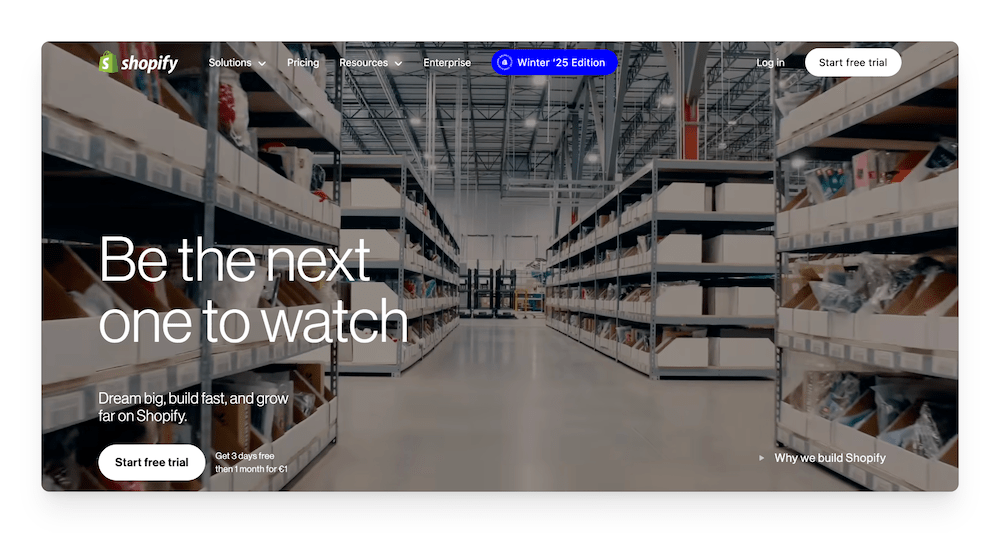
Shopify, founded in 2006, emerged from the founders’ desire to create an easy-to-use internet commerce platform after their dissatisfaction with existing options while trying to open a snowboard shop on the web. The cloud-based solution has since grown into a leading B2C ecommerce platform, renowned for its simplicity and user-friendliness, allowing anyone to set up an online store.
Shopify offers online sellers a comprehensive suite of tools to manage products, customize storefronts, process payments, and handle inventory across multiple sales channels, including web, mobile, social media platforms, and physical locations. The platform supports sellers with various apps and integrations, analytics for tracking performance, and robust 24/7 customer support.
Shopify offers a simple, intuitive base solution for setting up an online store, but it may not have all the services necessary to help you reach your specific business goals. To fully equip a store, sellers may need to use the Shopify App Store, which hosts applications that often require a paid subscription for additional features to assist with tasks like optimizing SEO or managing invoices.
Price: Shopify subscription plans start at $29 per month with fees of 2.9% + $0.30 per transaction.
Free trial: 3 days
Key features:
- 🔧 Easy-to-use store builder: Drag-and-drop functionality with customizable themes
- 💳 Built-in payment processing: Ability to accept credit cards, Apple Pay, Google Pay, and other payment methods without third-party integrations
- 📊 Comprehensive sales channels: Potential to sell on your website, social media, online marketplaces to meet customers where they are (Amazon, eBay), and in-person with Shopify POS
- 🎯 Marketing and SEO tools: Integrated email marketing, discount codes, abandoned cart recovery, and SEO features to drive traffic and boost sales
- 📱 Extensive app ecosystem: A plethora of apps in the Shopify App Store to extend your store’s functionality, from automation to data analytics
4. WooCommerce
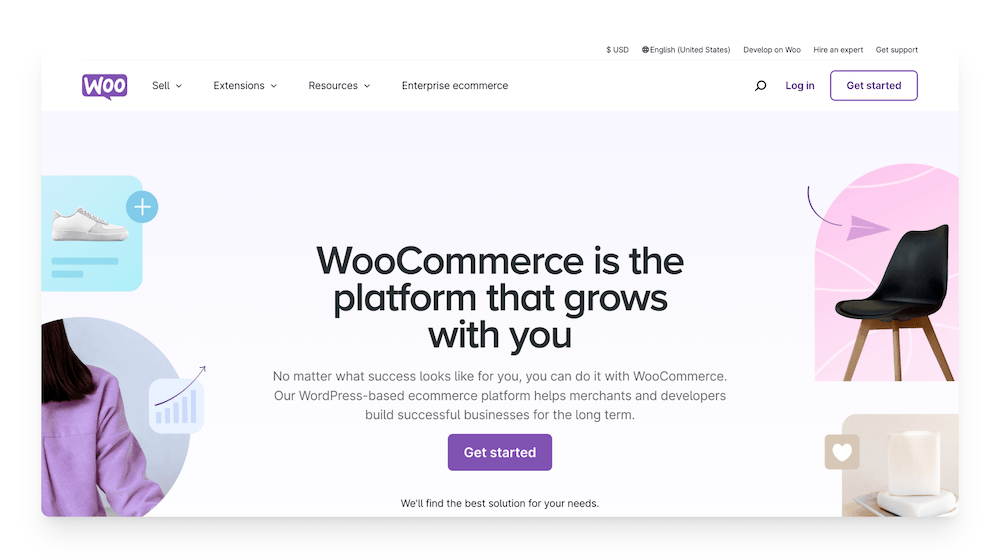
WooCommerce, launched in 2011, is a customizable, open-source ecommerce platform built on WordPress. It was developed by WooThemes, which was eventually acquired by Automattic in 2015. As a plugin, WooCommerce seamlessly integrates with WordPress, leveraging the platform’s flexibility and extensive content management capabilities, making it a popular choice for online sellers who already use WordPress.
Because WooCommerce is an open-source solution, merchants have lots of flexibility and room for customization when it comes to designing their stores. What’s more, they have access to a large support community, providing assistance with themes, plugins, and troubleshooting.
While the WooCommerce plugin is free, significant costs can accumulate for customization, premium plugins, and maintenance. Users will also need to have a decent amount of technical knowledge, as setting up and customizing WooCommerce can require more technical prowess than other plug-and-play platforms.
Price: There’s no cost to use the basic WooCommerce plugin, but you will need to consider the costs of website hosting and additional features for your business.
Free trial: N/A
Key features:
- 💻 Seamless WordPress integration: Built for WordPress, allowing you to turn any website into a fully customizable online store
- 👑 Full design flexibility: Access to thousands of themes and customization options to match your brand’s unique look and feel
- 💳 No transaction fees: Additional transaction fees aren’t charged, keeping more revenue in your pocket
- 🔌 Extensive plugin ecosystem: Ability to enhance your store with free and paid plugins for SEO, analytics, payment gateways, and automation
- 📦 Scalability and control: Self-hosted solution that gives you full control over data, hosting, and performance as your business grows
5. Squarespace
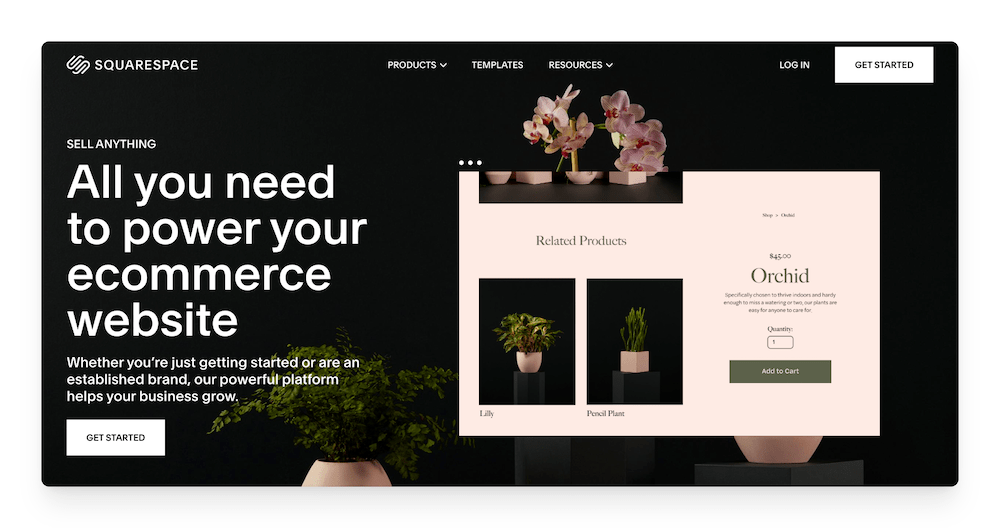
In 2003, Anthony Casalena founded Squarespace, which originally began as a blog hosting service and evolved into a comprehensive B2C ecommerce platform known for its design-centric approach. Its target user base consists primarily of creative professionals and small businesses, offering tools to build aesthetically pleasing and functional websites without needing coding skills.
Squarespace provides high-quality, customizable templates that make setting up a professional-looking shop a straightforward affair. It includes hosting, domain registration, and analytics, simplifying the technical aspects of running an ecommerce business.
Despite Squarespace being easy to use, however, the customization options are limited compared to other internet commerce platforms. It can also quickly get more expensive than other available solutions, especially when adding multiple features or scaling your business. While adequate for small retailers, it lacks some of the advanced ecommerce functionalities that larger businesses might require for extensive management of products or complex shipping options.
Price: Squarespace pricing begins at $23 per month. Squarespace also charges transaction fees of 3%.
Free trial: 14 days
Key features:
- 🖌 Beautiful, award-winning templates: Professionally designed templates that make your online store visually stunning and fully responsive
- 🔒 Password protection for pages: Option to set up password-protected pages for secure and confidential content
- 💻 Built-in blogging platform: Integrated blog to boost your content marketing efforts
- 🔍 SEO and marketing tools Basic SEO features, email campaigns, and social media integrations to help drive traffic and increase sales
- 📱 Mobile application: Effortless website management and updates through the mobile app
6. BigCommerce
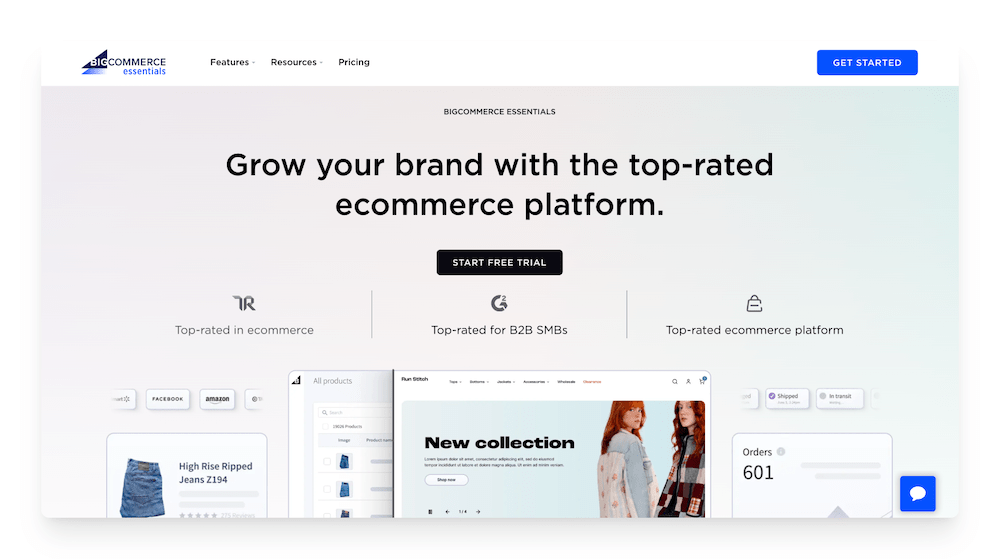
Launched in 2009, BigCommerce speedily established itself as a leading B2C and B2B ecommerce platform, catering to businesses of various sizes by supplying a powerful, scalable solution that supports complex online stores--no extensive coding knowledge required!
BigCommerce is known for handling large-scale ecommerce operations, making it a good option for businesses looking to grow. The BigCommerce cloud-based platform offers web commerce businesses a wide range of built-in features, including SEO tools, payment gateways, and multi-channel selling.
While feature-rich, BigCommerce’s pricing can be higher compared to other platforms, especially as you scale and require more advanced features. Some customers might also find BigCommerce's interface and the plethora of options overwhelming, making the BigCommerce platform possibly challenging for beginners.
Price: Subscriptions with the BigCommerce solution start at $29 per month, with no additional transaction fees except for certain payment methods.
Free trial: 15 days
Key features:
- 🚀 Scalability for growing businesses: Enterprise-level features, high performance, and multi-storefront capabilities to support business growth
- 💳 Flexible payment options: No additional transaction fees and support for multiple payment gateways, including PayPal, Stripe, Apple Pay, and more
- 📣 SEO and marketing tools: Advanced SEO features, built-in blog functionality, and omnichannel selling across Amazon, eBay, Facebook, and Google
- 🔧 Highly customizable and headless commerce: Open API and flexible integrations allow businesses to build fully customized shopping experiences
- 👨💻 Comprehensive customer support: 24/7 live chat, phone, and email support, plus a rich knowledge base and community forums
7. Wix
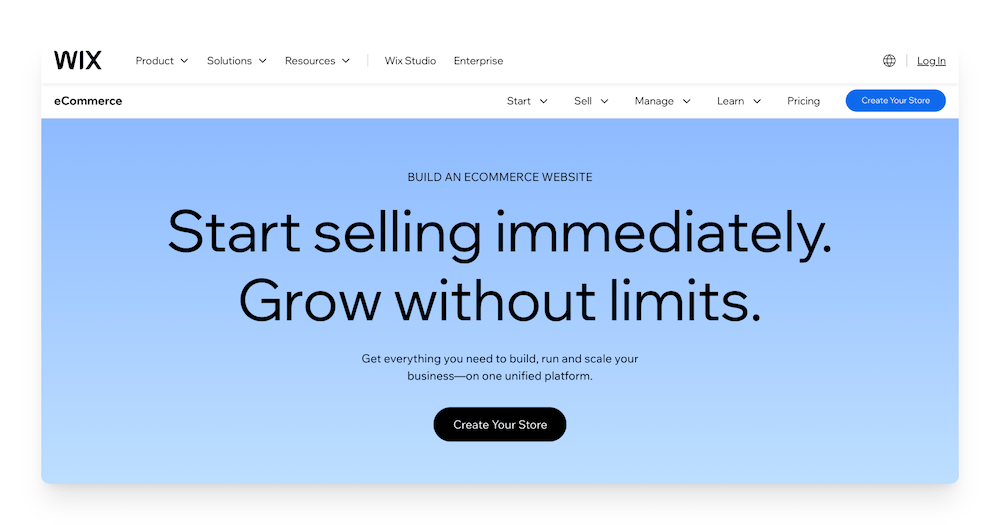
Originally a platform aimed at simplifying website creation, Wix, which was founded in 2006, expanded into internet commerce by allowing users to build online stores through an intuitive drag-and-drop interface.
Wix is acclaimed for simple user experience, making it ideal for beginners to set up and manage an online store. It gives merchants a wide range of customizable templates, enhancing the visual appeal of online stores.
Although Wix is suitable for small to medium-sized businesses, larger businesses might find it less capable of handling extensive online commerce needs compared to more specialized platforms. This can mean needing to take the time to search for third-party add-on features, many of which may cost money.
Price: Wix’s ecommerce plans begin at $29 per month, with no additional transaction fees except for certain payment methods.
Free trial: While Wix doesn’t offer a traditional free trial period for its paid plans, it does provide a 14-day money-back guarantee.
Key features:
- 🔧 Easy-to-use drag-and-drop builder: Ability to create a stunning online store with a user-friendly interface—no coding required
- 👩🎨 Customizable templates: Professionally designed, mobile-optimized templates to match your brand’s style
- 🔒 Secure and flexible checkout options Email campaigns, social media integrations, and automated SEO settings to increase visibility and drive traffic
- 📱 App market: A variety of free and paid add-ons and widgets
- 📦 Print-on-demand and dropshipping capabilities: Seamless integration with print-on-demand and dropshipping services to expand your product offerings
8. Etsy

Etsy, launched in 2005, started off as a unique internet marketplace focused on handmade, vintage, and craft supplies. It’s geared towards small artisans and crafters looking to reach a global customer base made up of people who appreciate the uniqueness and personal touch of handmade products.
Setting up a shop on Etsy is straightforward, making it accessible for beginners. One of the other big advantages of this web commerce platform is the fact that its focus on unique and artisanal products draws a dedicated customer base. In addition, it provides a supportive community and resources tailored to small, creative businesses.
Just like with Amazon, however, the competition on Etsy is intense among merchants, with many of them offering similar products for sale. Sellers also have limited control over their shop’s appearance and branding compared to other platforms. Another drawback to using Etsy to sell on the web is that the digital commerce platform charges different types of fees that can eat up profits for your business in a short amount of time.
Price: Etsy doesn’t charge a monthly subscription fee, but it does have numerous selling fees for internet commerce merchants, including a $0.20 listing fee, a 6.5% commission fee and a 3% + $0.25 payment processing fee per sale, and a 15% Offsite Ads fee (only payable when the seller makes a sale from one of these ads).
Free trial: N/A
Key features:
- 🏢 Global marketplace for unique products: Opportunity to reach millions of buyers looking for handmade, vintage, and custom products
- 💳 Built-in payment processing: Secure transactions with Etsy Payments, supporting multiple payment methods like credit cards, PayPal, Apple Pay, etc.
- 📊 SEO and marketing tools: Features for optimizing product listings for Etsy search, running Etsy Ads, and leveraging social media integrations to drive traffic
- 💻 Seller-friendly dashboard: Simplified product inventory management, order processing, and performance tracking with Etsy’s easy-to-use seller dashboard
- 👨💼 Community and support: Access to seller forums, educational resources, and Etsy’s dedicated customer support team for guidance
9. PrestaShop
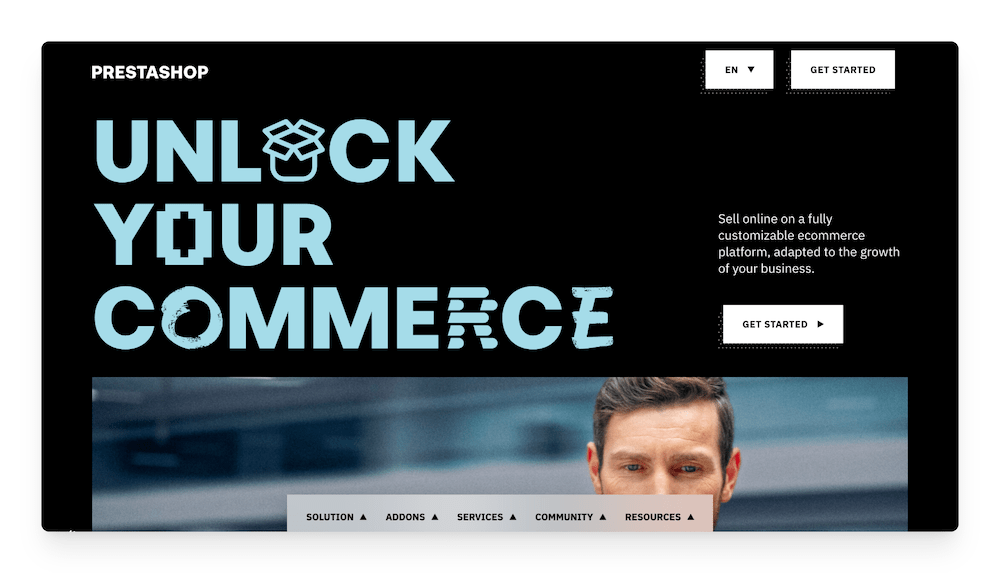
PrestaShop, founded in 2007 in France, is an open-source ecommerce platform that offers businesses the ability to create customized online stores. Initially developed as a student project, it has grown into a widely used platform with a focus on providing flexible ecommerce solutions for businesses all around the globe.
As an open-source solution, PrestaShop is free to download and use, and users can tailor their stores extensively due to its modular nature and the availability of numerous plugins and themes. Online sellers can also avail of a strong community on the platform and a marketplace full of modules and themes, bolstering the platform’s functionality.
Keep in mind, however, that setting up and customizing PrestaShop can be complex, necessitating a decent amount of technical expertise. Furthermore, while the software is free, business costs can accumulate for hosting, premium modules, and themes.
Price: Creating an ecommerce site is free with PrestaShop, but you will need to account for the expenses associated with website hosting and any additional features your internet commerce business may require. The platform also offers a plan with hosting, support, and ecommerce services, which begins at €24/month (around $26/month).
Free trial: 14 days (for hosted plan)
Key features:
- 🚀 Open-source and customizable: Fully open-source platform with extensive customization options through themes and modules
- 💸 Multiple payment options: Supports a variety of payment gateways, including PayPal, Stripe, and direct bank transfers
- 📈 Advanced product management: Flexible catalog management with bulk editing, product combinations, and stock control
- 📊 SEO and marketing tools: Built-in SEO features, discount management, and promotional tools to boost sales
- 🌎 Scalability and international reach: Multi-language, multi-currency, and multi-store capabilities for global expansion
10. Adobe Commerce (previously Magento)
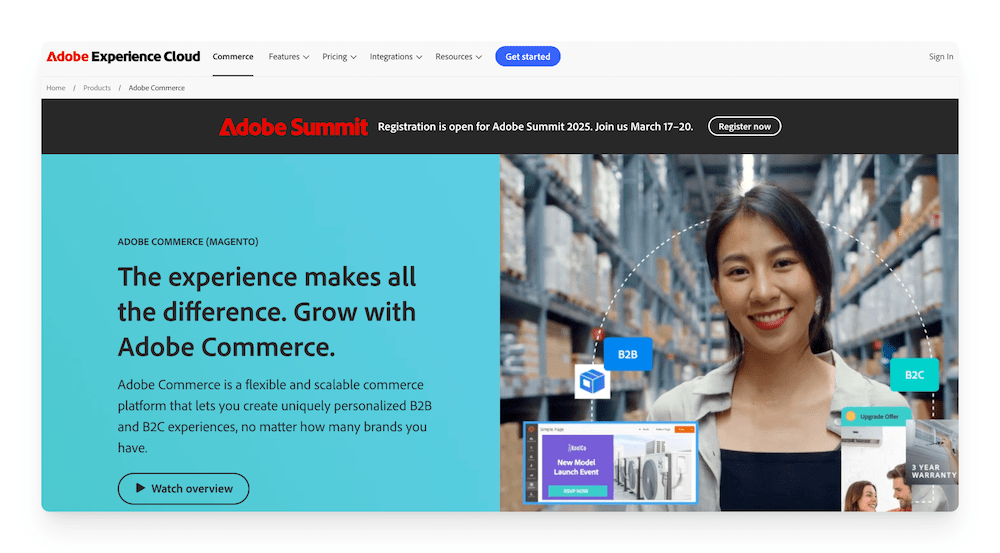
Adobe Commerce, formerly known as Magento, was originally released in 2008. It was acquired by Adobe in 2018 and rebranded, becoming part of Adobe’s extensive digital experience suite. As a B2C ecommerce platform, it’s known for its robustness, flexibility, and scalability, catering primarily to medium to large businesses.
Adobe Commerce provides customers with extensive customization options through a vast ecosystem of extensions and themes. It’s well suited for growing businesses due to its ability to handle large product catalogs and high traffic volumes. The Adobe internet commerce solution also offers easy integration with other Adobe products and third-party apps.
That being said, those new to running an ecommerce site may find the Adobe platform’s rich features and customization potential to be a bit overwhelming. What’s more, developing a site can require significant investment in development resources and external add-ons.
Price: Merchants should get in touch with the Adobe Commerce team for custom pricing.
Free trial: Adobe Commerce doesn’t appear to offer a free trial at this time, but interested users can contact the company for a demo.
Key features:
- 💻 Flexible and scalable: Highly customizable platform suitable for businesses of all sizes, from startups to enterprises
- 💳 Advanced payment and checkout options: Secure, seamless transactions with multiple payment gateways and a streamlined checkout process
- 🤖 AI-powered personalization: Uses Adobe Sensei AI to deliver personalized shopping experiences and product recommendations based on customer preferences
- 🔒 Robust security and performance: Built-in security tools, PCI compliance, data encryption, and CDN integration for fast-loading pages and a secure shopping experience.
- 🏬 Multi-store, multi-language, and B2B capabilities: Supports complex business models with multi-store setups, internationalization, and B2B features
11. Volusion
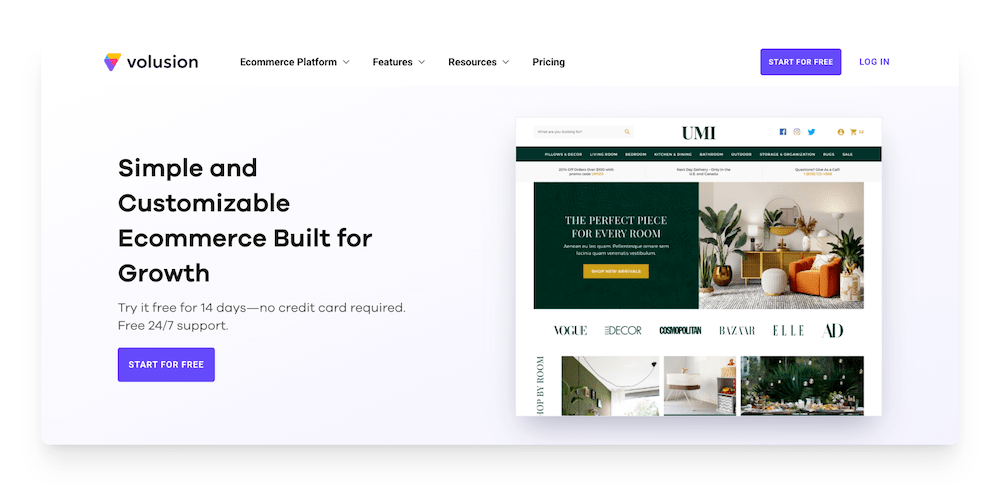
Volusion was founded in 1999 and stands as one of the earliest platforms to arrive on the online shopping scene. It’s designed to provide businesses with an all-in-one ecommerce solution, focusing on ease of use and integrated features suitable for small to medium-sized enterprises.
Volusion customers will have access to a user-friendly interface that simplifies the management of online stores. The solution includes a range of built-in functionalities, such as payment processing and inventory management, without the need for additional plugins.
Note that compared to other platforms, Volusion offers fewer customization options and a smaller selection of themes. In addition, Volusion places sales-volume and product-listing limits on its less expensive plans, which means that some customers may have challenges with scaling their businesses as their online traffic and sales grow.
Price: Volusion plans begin at $35 per month, with payment gateway maintenance fees ranging from 1.25% to 0.35% for every transaction, depending on your chosen plan. However, if you opt for the platform’s own payment gateway, Volusion Payments, you won’t need to pay this extra fee.
Free trial: 14 days
Key features:
- 🌐 All-in-one ecommerce solution: Fully hosted platform with built-in tools for store management, eliminating the need for your business to seek separate hosting
- 💰 Built-in payment processing: Secure transactions with Volusion Payments, PayPal, and other gateway integrations
- 📈 SEO and marketing tools: On-page SEO features, social media integrations, and email marketing tools to drive traffic and sales
- 📊 Comprehensive analytics and reporting: Real-time sales data, customer insights, and inventory tracking to optimize business decisions
- 👨💼 24/7 customer support: Access to expert support via chat, phone, and email, along with an extensive knowledge base
Why it’s important to pick the right B2C ecommerce platform for your business
Choosing the right B2C ecommerce platform is a critical decision that can significantly impact your business’s success. Whether you're a startup or an established brand expanding online, the platform you choose serves as the backbone of your digital storefront. It influences how customers interact with your brand, how efficiently you manage operations, and how well you can scale in the future.
Here’s why picking the right B2C ecommerce platform matters:
- Improved user experience: A well-designed platform ensures seamless navigation, fast loading times, and a mobile-friendly interface. This leads to higher customer satisfaction and increased conversions.
- Greater customization and flexibility: Every business has unique needs. A good platform allows you to tailor features, design, and integrations to match your brand and operations.
- More scalability: As your business grows, your web commerce solution should grow with you. The right platform can handle increased traffic, orders, and product listings without major disruptions.
- Better security and compliance: Protecting customer data is essential. Top platforms provide built-in security features and ensure compliance with regulations like GDPR or PCI-DSS.
- Larger library of marketing tools: The right platform includes tools to help you reach your audience, from SEO optimization to email marketing and social media integration.
- Cost savings: From upfront costs to transaction fees and maintenance, the best digital commerce platform for your business will offer a balance between price and value, helping you manage your budget effectively.
In short, choosing the right B2C ecommerce platform for your business sets the stage for sustainable growth, streamlined operations, and strong customer relationships.
Conclusion
Choosing the right B2C ecommerce platform is crucial for the success of your online business. Each platform dedicated to commerce on the web that you read about in this article, whether as single-seller software or a marketplace, offers unique features and comes with its own set of advantages and disadvantages.
When looking at the various internet commerce platforms available today, you’ll want to think about which one will allow you to best highlight your business and product catalog while also providing a great user experience for both you and your customers.
There are many reasons why you should use an ecommerce platform, and when deciding which solution to use for your own website, be sure to consider factors like budget, technical expertise, specific business needs, and scalability. By carefully assessing each option, you will be able to select a web commerce platform that not only aligns with your current business requirements but also supports your growth and adapts to future challenges.
When you create your ecommerce website with WiziShop’s AI-powered platform, you can take advantage of a plethora of tools and services to help in the launch, management, and development of your business. With all these features already included in your subscription, there’s no need to pay for third-party integrations—you will have everything you need at your fingertips!
There’s no time like the present... Create your WiziShop account today and get started with your ecommerce adventure!
Try WiziShop free for 7 days
THE EASIEST NO-CODE ECOMMERCE SOLUTION✅ No credit card required
✅ Access to all features
✅ No commitment


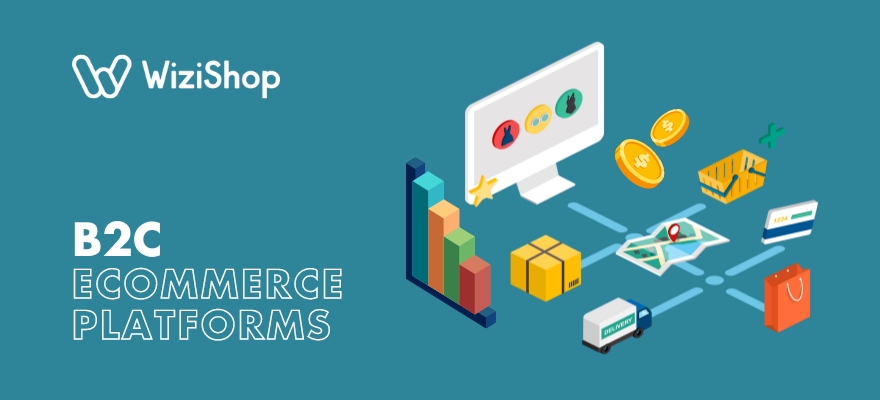







kamya le 14 August 2025 à 05:02
Aayushi Creation in Raipur le 23 November 2025 à 23:49
Mister Wizi le 26 November 2025 à 09:44
Thanks very much for your comment! I'm happy to hear that the article was helpful. :)